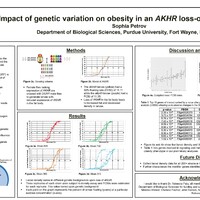Impact of Genetic Variation on Obesity in an AKHR Loss-of-Function Model
Item
Poster Number
22
Poster Title
Impact of Genetic Variation on Obesity in an AKHR Loss-of-Function Model
First Presenter
Sophia Petrov
Abstract
The ways the body manages nutritional content has been a topic of global interest for centuries, particularly when these are disrupted in metabolic disease, such as obesity. There is a large genetic component to the onset, severity, and progression of these diseases, but the identities and functions of those genes remains largely unknown. Drosophila melanogaster, commonly known as the fruit fly, provides a simpler model to help us better understand the synergistic contributions that genetic differences have on obesity in humans. We have employed the Drosophila Genetic Reference Panel (DGRP), a compilation of over 200 inbred Drosophila strains, as a tool to observe how genetic variation can impact complex phenotypes such as obesity and metabolic disease. We are using AKHR loss-of-function as a model of obesity. AKHR is the Drosophila version of a human receptor that binds to the hormone glucagon, which activates the breakdown of stored nutrients under fasting conditions. In its absence, fat is not broken down and the flies therefore become obese. We are reducing AKHR expression in the fat to induce obesity. In this experiment, Drosophila larvae are generated by crossing the DGRP to our AKHR loss-of-function model. We monitor larval fat content using a previously developed density assay as a proxy for obesity. After determining the concentration at which 50% of the larvae float for the different DGRP strains, we assessed our data through a preliminary genome-wide association analysis and identified several modifier genes to be further studied.
Year
2022
Embargo
no embargo
